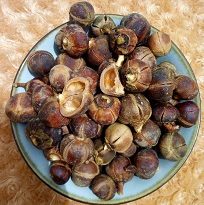Turkey Berry and Fertility
Turkey Berry and Fertility
Health Benefits of Turkey Berry During Pregnancy
There is no robust scientific evidence concerning the safety of turkey berries among women who are breastfeeding or pregnant. However, it’s common practice in some countries, for example, Ghana, for pregnant and breastfeeding women to eat raw turkey berry to enhance iron status and promote lactation

Turkey Berry Overview
The turkey berry is a tiny green fruit native to the tropics. These berries are found on thorny bushes that can spread quickly and take over fields and pastures, as well as replace native vegetation.
In certain regions, it is considered a delicacy, but in others, it is considered a harmful weed. You can’t argue with the fact that it’s good for you nutritionally, no matter how you feel about it. Iron, vitamins A and C, and antioxidants abound in turkey berries.
Turkey berry for fertility
Iron helps produce more red blood cells, which raise hemoglobin levels. This is important for pregnant women because low hemoglobin levels might result in anemia. Eating it uncooked will yield the best outcomes.
Second, herbalists utilize turkey berry during pregnancy to help pregnant women who have experienced miscarriages in the past (repeatedly) avoid miscarriages.
What is turkey berry?
Turkey berries are a kind of prickly, blooming shrub that bears big clusters of pea-sized, yellow-green berries that are useful for horticultural, medicinal, and culinary uses.
It goes by several names but its scientific name is Solanum torvum. It is a member of the nightshade family of plants.
The turkey berry is also known by other names, including:
- Devil’s fig
- Pea eggplant
- Prickly nightshade
- Shoo shoo bush
- Susumber
- Wild eggplant
Even though turkey berry grows well in a wide range of weather, it does best in sunny, mild areas. Like weeds, the plants spread readily. As a result, they are widespread throughout the planet, with populations found in the Pacific Islands, Asia, Africa, and the Americas.
Turkey berries are so widely used that their exact origins are unknown. Nonetheless, a lot of specialists think it’s most likely indigenous to South and Central America.
Turkey berry nutrition facts
What you get in a 100g serving of turkey berries:
- Calcium 22 mg
- Carbohydrates 03 g
- Dietary fiber 9 g
- Protein 32 g
- Iron 6 mg
- Magnesium 9 mg
- Total lipids (Fat) 0.27 g
- Vitamin A 70 µg
- Vitamin C 68 mg
- Zinc 2 mg
How to prepare turkey berry juice
The steps to prepare turkey berry juice are as follows:
- Pour a small amount of water over a handful of raw turkey berries.
- Mix the ingredients to get some juice out.
- To keep the extracted juice from turning bad, keep it refrigerated.
You could drink this juice to increase blood production. Scientists warn against consuming any filthy or improperly prepared turkey berries because they are poisonous.
How to cook turkey berry
Turkey berries have several nutritional advantages, but they are also a common addition to soups and stews in many households. The catch is that they don’t get cooked by themselves but rather in a dish with additional components. The recipes to make them are listed below:
- Turkey Berry Curry
- Mellon seeds with turkey berries (Aguturk Yum)
- Turkey Berry Pickle
- Palm nut soup with turkey berries (Palmiturk)
- Spicy Turkey Berry Fritters
Turkey berry Leaf tea ~ how to use turkey berry leaves
This tea has iron in it and is very nutritious. After being dried, turkey berry fruits are made into tea bags. Herbal tinctures and teas are made from turkey berries. In contrast, dried ones are processed to give teabags a fresh flavor.
Health benefits of Turkey berry
The turkey berry is used as a meal and an herbal cure for many different types of physical illnesses, such as bacterial infections, high blood pressure, and digestive problems. Nevertheless, there has been relatively little scientific study on the therapeutic benefits of turkey berries.
Nevertheless, preliminary data from experiments on animals and test tubes indicates that certain minerals and plant chemicals found in turkey berries may be the main contributors to the berry’s numerous stated health advantages. They include:
Potentially avoid and cure anemia ~ How to use turkey berry to treat anemia
One of the most prevalent nutritional deficits in the world is low iron. Inadequate iron consumption can lead to the common illness known as iron deficiency anemia. It is linked to symptoms such as exhaustion, lightheadedness, and dyspnea.
Turkey berries are frequently eaten to treat or prevent iron deficiency anemia because they are an especially rich source of plant-based iron.
Turkey berries are rich in iron, but new studies on animals suggest that their absorption in the digestive system may be hampered. Therefore, no assurance incorporating turkey berries into your diet will significantly raise your iron levels.
Foods strong in vitamin C, like bell pepper, citrus fruit, and strawberries, can be paired to improve the absorption of iron from plant-based diets.
- Could aid in lowering blood pressure: Preliminary studies have shown promise for turkey berry’s active components as a natural blood pressure-lowering agent.
- Gallic acid and ferulic acid are just two of the many rare chemicals found in the turkey berry, both of which have shown potent antioxidant and anti-inflammatory activities in laboratory experiments.
- Furthermore, a study conducted on rats with high blood pressure revealed that turkey berry extract markedly lowered their blood pressure.
- Possibility of fostering normal immunological response: Turkey berries contain strong antibacterial qualities that have been demonstrated in test tubes, and these qualities may support a healthy immune system in several ways.
- Treats indigestion and diarrhea: Turkey berries are also good for the digestive system; they aid in the relief of stomachaches, indigestion, and diarrhea. It’s interesting to note that berries are crucial in the treatment of gastric ulcers since they neutralize stomach acids.
- Prevents the development of intestinal worms: Consuming turkey berries regularly will shield your body from intestinal worm development. It’s interesting to note that you may powder them after drying them and use them as a cooking component in gravies.
Other benefits of turkey berry include:
- One study suggests that turkey berries may help treat the herpes simplex virus.
- It has been found that the antibacterial properties of turkey berries aid in the healing of cuts and ulcers as well as the maintenance of clean wounds.
- Supports diabetic treatment
- Shields against cancer turkey berries are crucial for the treatment of cancer because they have antifungal, antibacterial, and anti-abortive growth-inhibiting properties.
- Aids in renal disease treatment
- Aids in preventing gout, discomfort, and redness
- Because the turkey berries aid in the removal of uric acid, they are essential for preventing and minimizing discomfort, redness, and gout symptoms.
- Since treating inflammation is the initial step in treating many disorders, turkey leaves have analgesic properties.
Turkey berry juice for weight gain
Underweight people can mix half a glass of raw turkey berry juice with water and drink it before night. You will gain weight more steadily if you drink this juice and eat well every day. The raw berry juice can be chilled to keep it fresher longer and to cut down on its bitterness.

How to use turkey berry leaves
Throughout history, people have utilized the roots, stems, leaves, and fruit of the turkey berry plant for both culinary and medicinal uses. The leaves stems, and roots can be dried and eaten as a powder, tea, or tincture, while the fruit is usually cooked in oil or ghee and eaten intact.
Turkey berry leaves for cough
- Turkey berries may help treat lung infections, ease asthma, clear our airways, and decrease coughing, according to anecdotal evidence.
- Dried berries can be ground into a powder to help with lung inflammation, coughing, asthma, and other conditions by drying out mucus.
- It cures and prevents the flu and cold; you can achieve this by consuming the berry soup.
- To address mucous and phlegm; make a powder out of the dried turkey berries to handle this.
Turkey berry leaves health benefits
- Aids in Digestion.
- Manages anemia.
- Control diabetes.
- Control the menstrual cycle.
- Heart Health.
- Fever is well combated.
- Enhances Kidney Performance.
- Strengthens immunity.
The turkey berry juice with milk
You may take it every day. If you want like, you can add milk. Clean the turkey berries and blender and blend it to bring out its juice.
Turkey berry spiritual benefits
This berry has been used for decades by spiritual practitioners because of its ability to support meditation and spiritual growth.
It is said to be a powerful instrument for developing one’s spiritual consciousness and connecting with one’s higher self. Turkey Berry is thought to be an extremely strong defender.
Safety precautions and possible side effects
Turkey berries are widely used and generally regarded as safe, although there is insufficient information to determine the exact dosage and potential risk of adverse effects when consumed.
Turkey berries belong to the same class of chemicals as other nightshades, known as glycoalkaloids. Glycoalkaloids can have negative effects on the nervous system and digestive tract, including nausea, vomiting, diarrhea, lightheadedness, and disorientation when taken in high dosages.
As the plant ages, the amount of glycoalkaloids in turkey berries gradually decreases. Therefore, it is believed to be safer to limit your intake to completely mature turkey berry fruit.
Nevertheless, certain individuals can be more vulnerable to the effects of glycoalkaloids than others.
Conclusion
Due to its special nutritional and therapeutic qualities, turkey berries are a widely utilized plant worldwide. It is a member of the same plant family as peppers, tomatoes, and eggplant, among other familiar veggies.
Many ailments, including high blood pressure, wounds, anemia, and bacterial and viral infections, can be treated with turkey berry. However, the majority of the current research demonstrating its usefulness for these objectives is restricted to experiments on animals and test tubes.
The majority of individuals can safely eat turkey berries, but it’s crucial to check that they are ripe before eating them because unripe berries can have detrimental effects on the nervous system and the digestive system.
Before including turkey berries in your health and wellness regimen, especially if you have any underlying medical conditions, you should speak with your healthcare professional due to the paucity of research on the subject.
FAQs
Is turkey berries good for pregnancy?
Strong scientific data does not support the safety of turkey berries for pregnant or nursing mothers. Nonetheless, eating raw turkey berries is a typical practice for lactating and iron-deficient pregnant and nursing mothers in several countries, like Ghana.
Is Turkey good for fertility?
Turkey is a great source of iron and zinc, two essential elements that might increase fertility.
What are the health benefits of turkey berry?
- Aids in Digestion.
- Manages anemia.
- Control diabetes.
- Control the menstrual cycle.
- Heart Health.
- Fever is well combated.
- Enhances Kidney Performance.
- Strengthens immunity.
Which vitamin is present in turkey berry?
Vitamins A and C
Iron, calcium, salt, potassium, and vitamin C are among the minerals found in turkey berries. They have few carbohydrates and lipids.
Which berry is best for pregnancy?
During Pregnancy: Antioxidants, fiber, potassium, vitamin C, and folate are abundant in blueberries, strawberries, blackberries, and raspberries.
Scoop some out for a snack, add some to a salad, combine some into a smoothie, or top off your porridge or granola. If you can’t get fresh berries, choose frozen blueberries.
Why is it called turkey berry?
Etymology: derived from the fact that turkeys consume a lot of these berries.
Do turkey berries and milo give blood?
Turkey berries can be a lifeline for those with low hemoglobin since they boost blood production and lessen anemia and other blood-related illnesses. These berries can help with indigestion, acidity, diarrhea, and stomach pain, among many other digestive issues.
How do you use dried turkey berries?
You can fry dry turkey berries and consume them as a snack. They can be added to rice as a side dish after being stir-fried in oil. Additionally, they can be utilized to prepare stew that is served over rice or chapatis.
Which country is turkey berry found?
The Pacific Islands, which include Hawaii, Guam, and American Samoa, as well as tropical Africa, Asia, and Australia, have all seen the introduction and naturalization of turkey berries (Pacific Island Ecosystems at Risk 2001).
How do you use turkey berry powder?
Add to soups, stews, and smoothies. Daliha Foods, a Ghanaian firm, farms and processes the ingredients for Daliha Turkey Berry Teas and powders.
Daliha Foods is committed to saving lives by using turkey berry fruits that are cultivated naturally in the area and promoting a balanced diet.
Can we eat turkey berry seeds?
You can consume the turkey berry plant whole, from its roots to its berries. It treats anemia, lowers blood pressure, controls diabetes, and guards against the negative effects of chemotherapy. Overindulging in turkey berries might make you queasy and lightheaded.
How to make turkey berry powder?
Turkey berries or leaves should be dried, ground into a powder, and stored in a clean, airtight container in a cool, dry location.
How to use turkey berry for weight gain?
Gain in Weight: Those who are underweight can also mix uncooked turkey berries with water and drink half a glass right before night. Eating healthily and drinking this together improve weight gain.
Refrigerating blended raw berries helps them stay fresh longer and reduces their bitterness.
How do you clean turkey berries?
Use a mortar and pestle to pound the fresh turkey berries until they are clean.
The seeds will settle when you thoroughly wash the pounded turkey berries in a bowl of water by rubbing them between your fingers. The turkey berries are now prepared for the soup after giving them another wash.
How do you take the bitterness out of turkey berries?
It is typically advised to de-seed turkey berries before using them uncooked to eliminate any bitterness.
Crush the berries and extract the seeds using a rolling pin or a mortar and pestle. To keep the crushed berries from discoloring, soak them in water. After draining, use the soaked berries to make any kind of cuisine.

How do you store turkey berries in the freezer?
Use an airtight, freezer-safe plastic bag to freeze fresh berries. To avoid clumping, remove any stems or leaves and arrange them flat in a single layer. These will be frozen a few hours from now.
At this point, you have the option of leaving them in the bag or moving them to another airtight container.
Turkey berries and milk for weight gain ~ How to use turkey berries for weight gain?
Health Benefits of Abeduru (Turkey Berries)
Gained weight: Underweight Individuals can also mix uncooked turkey berries with water and drink half a glass right before night.
Eating healthily and drinking this together improve weight gain. Refrigerating blended raw berries helps them stay fresh longer and reduces their bitterness.


